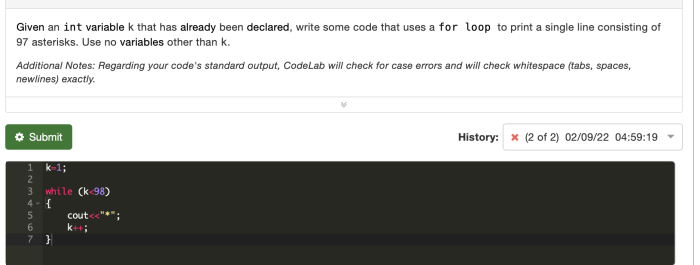Given an int variable k that has already been declared, this article delves into the intricacies of int variables, exploring their declaration, initialization, data types, arithmetic operations, comparison and logical operators, input and output, and various applications. With a comprehensive approach, this article provides a thorough understanding of int variables, their usage, and their significance in programming.
1. Variable Declaration and Initialization

An int variable is a data type in programming languages that is used to store integer values. Declaring a variable means creating a symbolic name for a memory location where the value will be stored. Initializing a variable means assigning a value to the memory location associated with the variable.
Syntax
int variableName = value;
Examples
int age = 25;int count = 0;int score =-10;
Scope and Lifetime
The scope of a variable refers to the part of the program where the variable is accessible. The lifetime of a variable refers to the duration during which the variable exists in memory. Int variables are typically declared within a function or block of code and have a scope that is limited to that function or block.
2. Data Types and Casting
Data Type
An int variable can store integer values. The range of values that can be stored depends on the implementation and platform. In most cases, int variables can store values in the range of -2 31to 2 31-1.
Casting, Given an int variable k that has already been declared
Casting is a process of converting a variable from one data type to another. Int variables can be cast to other data types, such as double or float, using the cast operator (type).
Examples
double d = (double) age;float f = (float) score;
3. Arithmetic Operations

Arithmetic operations can be performed on int variables using the following operators:
+(addition)-(subtraction)*(multiplication)/(division)
Operator Precedence and Associativity
The order in which arithmetic operations are performed is determined by operator precedence and associativity. Parentheses can be used to override the default precedence and associativity.
4. Comparison and Logical Operators

Comparison Operators
Comparison operators are used to compare two int variables. The following comparison operators are available:
==(equal to)!=(not equal to)<(less than)>(greater than)<=(less than or equal to)>=(greater than or equal to)
Logical Operators
Logical operators are used to combine multiple boolean expressions. The following logical operators are available:
&&(and)||(or)!(not)
5. Input and Output
Input
Int variables can be read from the user using input streams. The following code reads an integer from the standard input:
int input;cin >> input;
Output
Int variables can be printed to the user using output streams. The following code prints an integer to the standard output:
cout << output;
6. Applications and Use Cases: Given An Int Variable K That Has Already Been Declared

Int variables are widely used in various applications and use cases, including:
- Counting
- Tracking
- Data processing
- Mathematical calculations
Int variables offer advantages such as efficient memory usage and fast computation. However, they have limitations in terms of range and precision.
General Inquiries
What is the purpose of declaring an int variable?
Declaring an int variable allocates memory for storing an integer value and provides a symbolic name to refer to that memory location.
How can I initialize an int variable?
An int variable can be initialized with a specific integer value during its declaration, such as int k = 5;
What is the range of values that can be stored in an int variable?
The range of values for an int variable depends on the specific programming language and system architecture, but typically it ranges from -2,147,483,648 to 2,147,483,647.